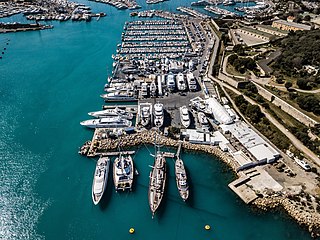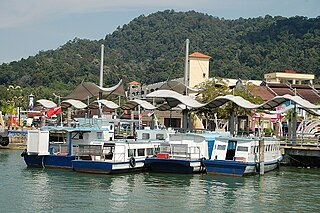
A shipyard is a place where ships are built and repaired. These can be yachts, military vessels, cruise liners or other cargo or passenger ships. Dockyards are sometimes more associated with maintenance and basing activities than shipyards, which are sometimes associated more with initial construction. The terms are routinely used interchangeably, in part because the evolution of dockyards and shipyards has often caused them to change or merge roles.
The Naval Group is a global and major French defense contractor and an industrial group that specialized in naval-based defense platform and the marine renewable energy. The group employs next to 16,000 people in 18 countries. The company is owned in part by the Agence des participations de l'État, a private company through which the French state holds a 62.49% stake, Thales holds 35% and the personnel a 1.64% stake. The remaining 0.87% are owned by the heir to the French naval dockyards and the Direction des Constructions et Armes Navales (DCAN), which became the DCN in 1991, DCNS in 2007 and Naval Group since 2017.

The Royal Malaysian Navy is the naval arm of the Malaysian Armed Forces. RMN is the main agency responsible for the country's maritime surveillance and defense operations. RMN's area of operation consists of 603,210 square kilometers covering the country's coastal areas and Exclusive Economic Zones (EEZ). RMN also bears the responsibility of controlling the country's main Sea Lines of Communications (SLOC) such as the Straits of Malacca and the Straits of Singapore and also monitors national interests in areas with overlapping claims such as in Spratly.

Boustead Holdings Berhad was founded in 1828 as Boustead & Co in Singapore by Edward Boustead, an English businessman. The company was incorporated in 1961 under the Kuala Lumpur, Singapore, Shenzhen and Shanghai Stock exchanges.
DRB-HICOM Berhad is one of Malaysia's leading corporations, involved in the automotive manufacturing, assembly and distribution industry through its involvement in the passenger car and four wheel drive vehicle market segment, the national truck project and the national motorcycle project. DRB-HICOM is the majority shareholder of Malaysia's national car company, PROTON, with China's Zhejiang Geely Holding Group the other shareholder since an equity sale in 2017.The Group also owns national motorcycle company MODENAS, with Japanese two-wheeler giant Kawasaki as its partner.

Lumut is a coastal town in Manjung District, Perak, Malaysia, situated about 84 km (52 mi) from Ipoh, 12 km (7.5 mi) from the town of Sitiawan and it is the main gateway to Pangkor Island before established Marina Island Pangkor as second gateway. It is noted for seashell and coral handicrafts. This once little-known fishing town has since become the home base of the Royal Malaysian Navy and the site of the biggest naval shipbuilder in Malaysia, Boustead.

Malaysia Marine and Heavy Engineering Holdings Berhad is a Malaysian owned shipbuilding and heavy engineering industries company. It was formerly known as Malaysia Shipyard and Engineering Sdn Bhd. MHB has been long involved in oil and gas engineering and construction works.
Oriental Holdings Berhad is a Malaysian conglomerate that owns automotive dealerships, automotive component manufacturers, financial services, healthcare, property development, retailing and plantations.
Penang Outer Ring Road (PORR) is a planned expressway in George Town, Penang, Malaysia. If constructed, it will connect Gelugor in the south, near Penang Bridge to Tanjung Bungah in the north. After a mid-term review of the Ninth Malaysia Plan, this project, together with Penang Monorail has been postponed indefinitely.
The Malaysian Trades Union Congress, abbreviated MTUC, is a national trade union centre in Malaysia. It was formed in 1949 and was originally known as the Malayan Trades Union Council. It then changed its name to the Malayan Trades Union Congress in 1958, and then to its current name with the formation of Malaysia.

The Kasturi-class corvettes are two ships of the Royal Malaysian Navy, KD Kasturi and KD Lekir. They were acquired in the mid-1980s. The two ships constitute the Malaysian Navy's 22nd Corvette Squadron, their homeport being Lumut. After about 25 years of service, they underwent an extensive modernisation known as Service Life Extension Program (SLEP) starting in 2009, enabling them to be employed for another 10 to 15 years. They have since been returned to active duty.

The Kedah-class offshore patrol vessels of the Royal Malaysian Navy (RMN) are six ships based on the MEKO 100 design by Blohm + Voss. Originally, a total of 27 ships were planned, but due to programme delays and overruns, only six were eventually ordered. Their construction began in the early 2000s, and by 2009, all six were in active service. The six vessels are named after Malaysian states.
The German Naval Group is a consortium of German industrial companies that bid and won a major contract to design and build the New Generation Patrol vessels (NGPV) for the Royal Malaysian Navy.
Penang Shipbuilding and Construction - Naval Dockyard Sdn Bhd (PCS-ND), was a division of the Penang Shipbuilding and Construction Industries Bhd (PCSI), a Malaysian Government-Linked Company (GLC), based in Lumut, Perak, Malaysia. The company's primary role is to maintain the Royal Malaysian Navy (RMN) fleet and the Lumut Naval Dockyard. However, a management and financial crisis in 2005 result the Malaysian Government to enforced the PSC-ND to be merged under Boustead Holding Bhd and renamed Boustead Naval Shipyard Sdn Bhd. The company has since been taken over by Boustead Heavy Industries Corporation Berhad.

Malaysia Airports Holdings Berhad is a Malaysian airport company that manages most of the airports in Malaysia. The firm was recently awarded the duty to manage airports in international destinations. It has its head office in the Malaysia Airports Corporate Office in the Persiaran Korporat KLIA in Kuala Lumpur International Airport (KLIA), Sepang, Selangor.

The Maharaja Lela-class frigates is a class of six stealth frigates being built for the Royal Malaysian Navy (RMN). The ships are based on an enlarged version of the Gowind-class corvette, designed by DCNS of France. The contract has been finalised and it has been decided that all six ships will be built by local shipbuilder Boustead Heavy Industries Corporation (BHIC) for the RMN at a ceiling price of RM9 billion, starting from 2015. The ships will be 111 metres s long with a displacement of 3,100 tonnes.

Labuan Shipyard and Engineering (LSE) is a Malaysian shipbuilding company based in the East Malaysian island of Labuan, Sabah. It is the biggest shipyard in Borneo.
The Keris class are a class of large patrol vessels of the Royal Malaysian Navy (RMN) with a length of 69 metres and displacing 700 tons. A total of 18 ships are planned. As of 2018, four ships have been funded by the Malaysian government.

Destini Berhad is a Malaysian company that is involved in heavy industry, defence industry and oil and gas industry. This company was formed in 1991 under the name of Satang Jaya Sdn Bhd. At the beginning, this company involved in the business as a supplier of aviation tools and spare parts from Original Equipment Manufacturers (OEM) to Malaysian government especially for Malaysian Armed Forces. The company first time entry into Bursa Malaysia in December 2005 and in September 2011, Satang Jaya Sdn Bhd changed its name to Destini Berhad as a part of company expansions. Destiny Berhad consist of four divisions which is System Enhancement Resources & Technologies (SERT) for land systems, Destini Aviation for aerospace, Destini Armada for marine and Destini Oil Services for oil and gas.

















